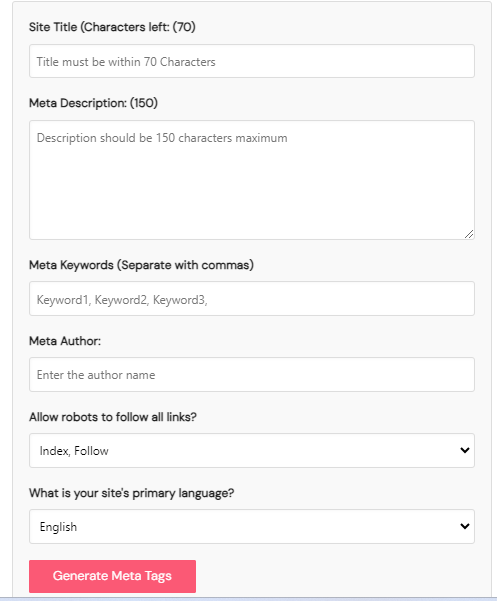Free Meta Tag Generator: And What Is Their Role in SEO?
- By: khanexplore
- On:
- 0 Comment

In the vast world of the internet, millions of websites are competing for attention. To stand out, it’s essential to have a well-optimized website that search engines like Google can easily understand. One of the key components that help search engines recognize and rank your site are meta tags. In this article, we’ll explore what meta tags are, why they are important for your website’s ranking, and how they work.
What Are Meta Tags?
Meta tags are small pieces of text or code embedded in a website’s HTML that provide information about the content on that page. Unlike regular content, meta tags are not visible to visitors when they visit your site; instead, they are used by search engines to understand the context and content of your web pages.
There are several types of meta tags, but the most commonly used ones include:
- Title Tag: This is the title of your web page that appears in the search engine results. It’s crucial for attracting clicks from users.
- Meta Description: This is a brief description of the page’s content. It also appears in search engine results and can influence whether a user clicks on your link.
- Meta Keywords: These are a list of keywords relevant to your page’s content. Although not as widely used by search engines today, they were once a significant factor in ranking.
- Robots Meta Tag: This tag instructs search engines on whether they should index a page and follow the links on that page.
Why Are Meta Tags Important for Website Ranking?
Meta tags play a crucial role in how search engines perceive and rank your website. Here’s why they are important:
- Improving Search Engine Visibility: Meta tags help search engines understand what your content is about. When your meta tags are relevant and well-optimized, search engines are more likely to display your pages in response to relevant search queries.
- Boosting Click-Through Rates (CTR): A well-crafted title tag and meta description can attract users to click on your link in the search results. If your meta tags are appealing, more people are likely to visit your site, which can improve your search rankings over time.
- Controlling How Your Pages Are Indexed: With robot meta tags, you can guide search engines on how to index your pages. For example, you can prevent search engines from indexing certain pages that you don’t want to appear in search results.
- Enhancing User Experience: By providing clear and relevant meta descriptions, you help users understand what they will find on your page, leading to a better user experience and potentially higher engagement.
How Do Meta Tags Work?
When a search engine crawls your website, it looks at the meta tags to gather information about your page. Here’s a simple breakdown of how this process works:
- Crawling: Search engines send out crawlers (spiders or bots) to visit and scan your web pages. These crawlers analyze the content, including the meta tags.
- Indexing: After crawling, the search engine decides how to index your page in its database based on the information gathered. Title tags and meta descriptions play a significant role in this process.
- Ranking: When a user enters a search query, the search engine retrieves pages from its index that match the query. Meta tags, particularly the title and description, help the search engine decide where your page should rank in the search results.
- Displaying: Finally, the search engine displays your page in the search results. The title tag appears as the clickable link, and the meta description appears below it, giving users a summary of what they can expect if they click on your page.
Using a Free Meta Tag Generator
Creating effective meta tags can be challenging, especially if you’re not familiar with HTML. That’s where a Free Meta Tag Generator comes in handy. This tool simplifies the process by allowing you to input basic information about your web page (such as the title, description, and keywords), and then it automatically generates the HTML meta tags for you.
Using a meta tag generator ensures that your meta tags are properly formatted and optimized for search engines, saving you time and helping to improve your site’s SEO.
Conclusion
Meta tags are a small but powerful part of your website’s SEO strategy. They help search engines understand your content, improve your site’s visibility in search results, and can even enhance user experience by providing clear, concise information about your pages. By using a Free Meta Tag Generator, you can easily create optimized meta tags that contribute to better search engine rankings and more traffic to your website.
